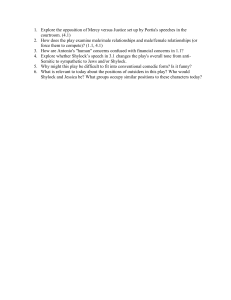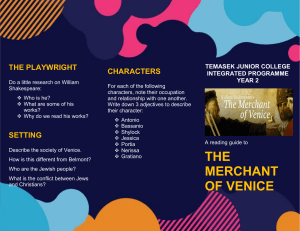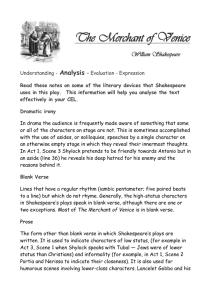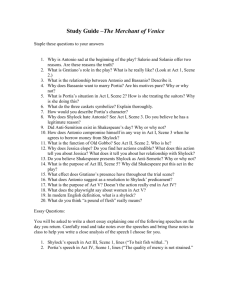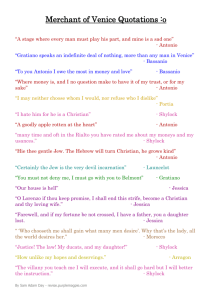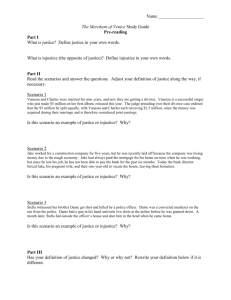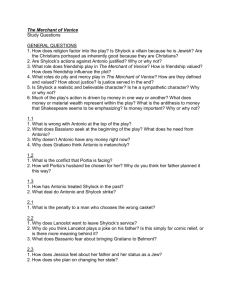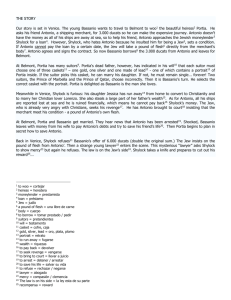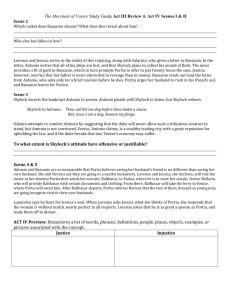The Merchant of Venice Review & Discussion Questions
advertisement
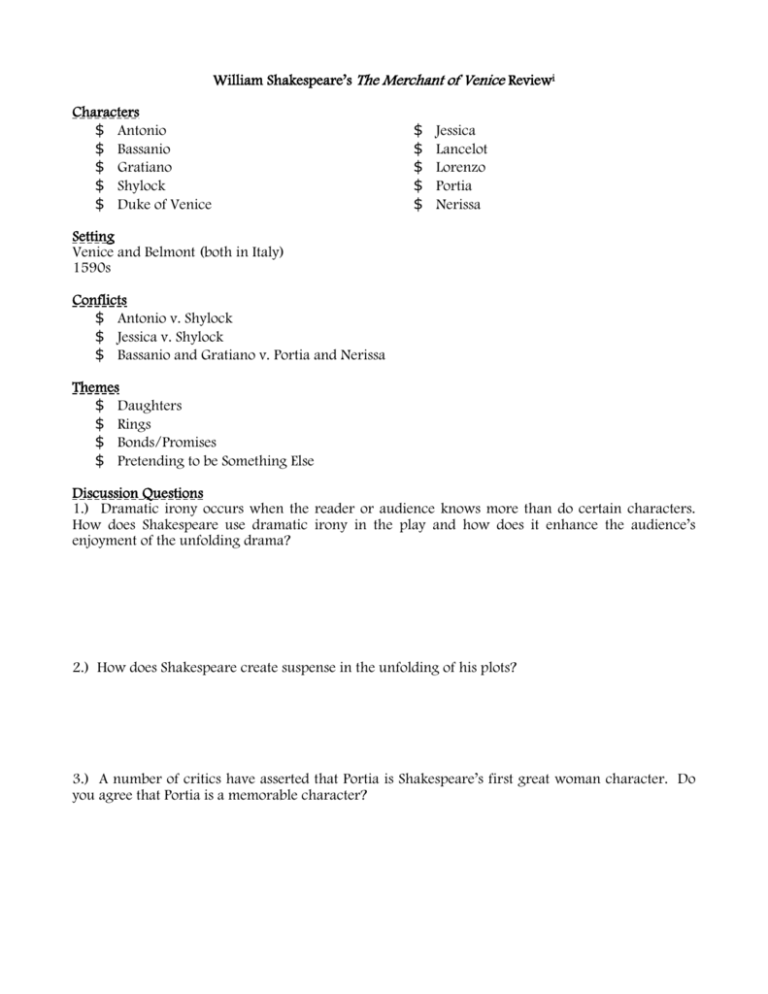
William Shakespeare’s The Merchant of Venice Reviewi Characters $ Antonio $ Bassanio $ Gratiano $ Shylock $ Duke of Venice $ $ $ $ $ Jessica Lancelot Lorenzo Portia Nerissa Setting Venice and Belmont (both in Italy) 1590s Conflicts $ Antonio v. Shylock $ Jessica v. Shylock $ Bassanio and Gratiano v. Portia and Nerissa Themes $ Daughters $ Rings $ Bonds/Promises $ Pretending to be Something Else Discussion Questions 1.) Dramatic irony occurs when the reader or audience knows more than do certain characters. How does Shakespeare use dramatic irony in the play and how does it enhance the audience’s enjoyment of the unfolding drama? 2.) How does Shakespeare create suspense in the unfolding of his plots? 3.) A number of critics have asserted that Portia is Shakespeare’s first great woman character. Do you agree that Portia is a memorable character? 4.) It has been argued that Bassanio is too weak a character to merit the love of Portia. He is a spendthrift, an idler, and a gold digger. How would you assess Shakespeare’s characterization of Bassanio? 5.) It is early in the play when Shylock proposes his “merry bond” with Antonio (I,iii). Is it likely that Shylock was already planning revenge upon his long-time enemy? If not, why would he propose such a bond? 6.) Explain the significance of the inscription on the lead casket. 7.) In looking at the structure of the play, what is the turning point (climax) of the drama? 8.) Why does Antonio agree to forfeit one pound of flesh if he fails to repay the borrowed money on time? 9.) What is ironic about Shylock’s decision to leave his keys with his daughter? Should Jessica be regarded as a thief for taking money with her when she elopes with Lorenzo? 10.) Why do you think Portia’s father insisted, as a condition of the challenge, that those who attempt but fail the test of the caskets promise to never seek another wife? 11.) Compare the mood of Act III, scene ii with scene i. What is the dramatic importance of scene ii? 12.) What appeal does the Duke of Venice make to Shylock as the trial opens? 13.) Is money the most important thing in the world to Shylock? 14.) How does Shakespeare turn the tables on the major characters during the trial scene? 15.) In Act II, Jessica dresses as a boy to escape her father’s house. In Act IV, Portia and Nerissa dress as young men in order to save Antonio in court. What do their decisions to disguise themselves as men imply about the roles of men and women of their time? 16.) What about the behavior of Bassanio and Gratiano in Act V adds to the humor of the conclusion of the ring plot? 17.) Shakespearean scholars disagree about the role of Jessica in Act V. Some claim that the hints of sadness in her are meant to remind us that a legacy of tragedy from Shylock’s life and fate continue in her and in Belmont, as well as in Shylock. Others maintain that Jessica’s happiness with Lorenzo in Belmont cancels out Shylock’s malice and vengeance and symbolizes the ultimate triumph of love over hate. Which position do you take? Explain your answer. 18.) This play has been called a romantic comedy, a tragedy, and Shakespeare’s first tragicomedy. State and explain your opinion about which label most accurately describes The Merchant of Venice. Important Items $ Three caskets – gold, silver, and lead $ The three options a suitor has when choosing $ The inscriptions on the caskets $ How Shylock has thrice lost money $ The stipulations of the bond o What happens if Shylock does not adhere to the conditions o What the Duke decides to do with Shylock o What Antonio decides to do with Shylock $ Who takes the rings from who $ The letters Portia brings back to Belmont $ The letter Nerissa brings back to Belmont i This review is a compilation of my own personal questions, and questions coming from the Parallel Text of The Merchant of Venice and from Masterprose, both published by Perfection Learning®.
